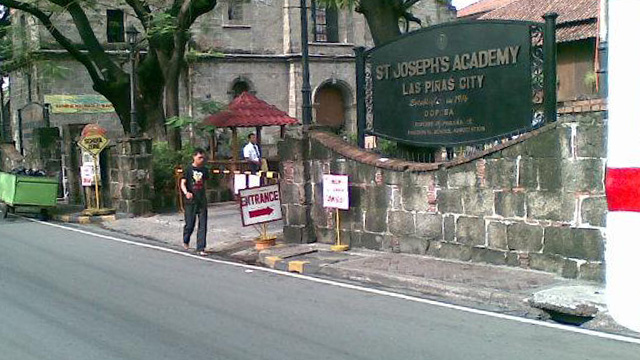SUMMARY
This is AI generated summarization, which may have errors. For context, always refer to the full article.

MANILA, Philippines – Thou shall not bear false witness against thy neighbor.
For violating this commandment, a monsignor has put a Catholic school’s finances in jeopardy. An accountant he falsely accused a decade ago won the illegal dismissal case she filed against school officials, including two monsignors.
The Supreme Court has ordered the St. Joseph’s Academy (SJA) in Las Piñas to pay its former accounting clerk Ma. Doralina Garcia in back wages and other benefits, which her lawyer estimates to have reached P5 million.
It was a 10-year battle of clearing her name and dignity.
The case began on April 4, 2003. Monsignor Allen Aganon, then the director of SJA, ordered Garcia to explain why two former employees were still on the payroll for a certain period when they were no longer employed in the school.
Garcia apologized for her lapse, saying that, as the only accounting clerk for the entire school, she was overburdened with work and overlooked this.
She, however, gave assurances to her boss that the salaries of the two former school employees were being kept in the school vault for safekeeping and had not been deposited in their bank accounts.
“I am assuring you that I do not have any bad intentions on these ‘overlooked names’ on the payroll,” Garcia said in her written reply. She said she had honestly performed her duties since being hired as the school’s accounting clerk in 1988.
Three days later, Garcia returned to the school cashier a total of P28,635 representing the salaries of the two former employees.
Aganon was not placated. He hired auditing firm PM Benitez and Associates to conduct a special audit of the school payroll.
Almost two months later, Garcia was placed under preventive suspension. On June 5, 2003, a review committee headed by Fr Fidel Fabile charged her with gross misconduct, dishonesty, fraud and breach of trust.
In dismissing her, Fabile said the review committee found that a third former employee was also on the payroll despite being no longer connected with the school.
In her defense, Garcia asked for bank reconciliation statements, to prove her point that there was no missing money. This was however denied to her.
Act of vengeance
There were efforts to settle the case out of court as early as August 2003, but Monsignor Aganon refused to entertain them. He dismissed Garcia for gross misconduct, prompting her to go to court.
In filing a perjury case against Aganon, Garcia denied the charges and accused the monsignor of targeting her as “an act of vengeance.” The priest, she said, was facing corruption charges himself and he suspected Garcia of leaking the school’s financial documents.
Garcia also brought her case before the National Labor Relations Commission (NLRC), where labor arbiter Jose de Vera decided the dispute in Garcia’s favor. The labor arbiter concluded that no money was missing, and that the findings of the external auditing firm was not conclusive whether the school’s money had been misappropriated.
The labor arbiter sided with Garcia’s argument that while she was the one who prepared the payroll, she was not aware who should be included in it since the power to hire and fire rested on Aganon as the school director. Garcia said she was not informed that the former employees in question were no longer connected with the school.
Thus, Garcia could not be faulted for including the former employees in the payroll since she was not properly informed in the first place.
All the way to the SC
However, the 3rd division of the NLRC reversed the labor arbiter’s findings. It said Garcia’s dismissal was justified, based on her admission of lapse and the loss of confidence of her employer. This prompted Garcia to elevate her case to the Court of Appeals (CA).
The CA’s 14th special division sustained the labor arbiter’s original findings that Garcia committed no bad faith in still including the school’s former employees in the payroll, as she was not informed they were no longer connected with the school. The CA took notice that the dismissed clerk was able to return the money when Aganon demanded it.
The appellate court also took to task the NLRC for grave abuse of discretion when it reversed the arbiter’s findings.
The CA faulted the school for failing to prove that money had been misappropriated, which could have easily been proven with documents. “Not only did St. Jospeh’s Academy fail to prove gross misconduct, it was also unsuccessful in showing that the latter is guilty of willful breach of trust and confidentiality,” the CA said.
Granting that Garcia was liable, the CA said that her dismissal was “too severe a penalty considering that there was no embezzlement. The length of the employee’s service and the absence of previous derogatory record are factors that should be taken into account.”
Aganon and the school appealed the CA ruling before the Supreme Court, but the tribunal said they failed to show “any reversible error” in the appellate court’s decision. In April 2012, the ruling became final and executory.
Garcia’s counsel, Atty Sabino Padilla III, said back wages and other benefits entitled to her client now amounts to almost P5 million. But almost a year since the SC’s final judgment, Garcia and the school are still in the process of arriving at a mutually agreed computation. – Rappler.com
Add a comment
How does this make you feel?
There are no comments yet. Add your comment to start the conversation.